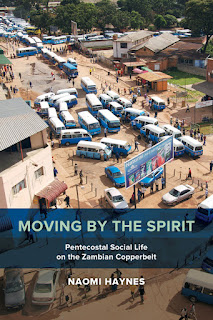 The Anthropology of Christianity: Unity, Diversity, New Directions and of the Social Analysis special issue Hierarchy, Values, and the Value of Hierarchy. She is also co-curator of the Anthropology of Christianity Bibliographic Blog.
The Anthropology of Christianity: Unity, Diversity, New Directions and of the Social Analysis special issue Hierarchy, Values, and the Value of Hierarchy. She is also co-curator of the Anthropology of Christianity Bibliographic Blog.Haynes applied the “Page 99 Test” to her new book, Moving by the Spirit: Pentecostal Social Life on the Zambian Copperbelt, and reported the following:
From page 99:Learn more about Moving by the Spirit at the University of California Press website.…Bana Mfuwe had persevered despite these difficulties, she explained, and had ultimately experienced a breakthrough. The women listened attentively as she spoke of how her husband had welcomed her back into the home and no longer stood in the way of her religious practice, but instead allowed her to host meetings at their house. And not only that; he also gave her money for household expenses, bought her gifts, and—notably—called her ‘Sweetie’.This bit of ethnographic detail, excerpted from a larger testimony-cum-sermon that I recorded during my fieldwork with Pentecostal believers on the Zambian Copperbelt, speaks to the broader argument of my book, Moving by the Spirit. My primary claim in this monograph is that Pentecostal Christianity offers a set of social and cultural frames that make life in urban Zambia possible. More specifically, Pentecostalism allows believers to “move,” as people on the Copperbelt put it – to advance according to multiple, overlapping metrics of achievement, whether socioeconomic status, professional development, or through lifecycle milestones like marriage or parenthood. To this list, Pentecostalism also adds spiritual achievement, perhaps in an improved capacity to pray, sing, or prophesy. Pentecostal adherence does this because it embeds believers in networks of relationships that propel them forward along these various axes. Of these various relationships, the most important is unquestionably a layperson’s connection to her pastor, whose superior spiritual (and in some cases economic and social) status means that he or she is able to help a believer move by pulling her up. This is why the testimony that Bana Mfuwe gave, including the details of her happy marriage, was so important. By sharing how she had “moved” on to enjoy, among other things, such a good relationship with her husband, Bana Mfuwe presented herself as someone capable of effecting similar transformations for others. By building relationships with church leaders like Bana Mfuwe, then, believers “move by the Spirit,” and in so doing seek to make a good social and material life for themselves and their families.
--Marshal Zeringue



